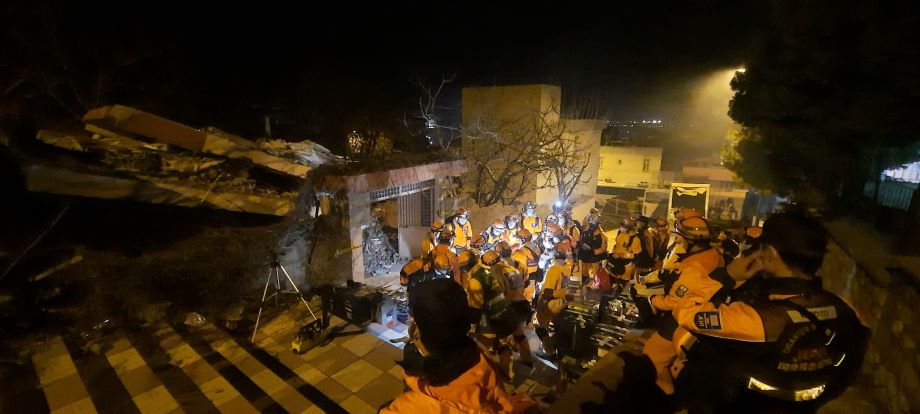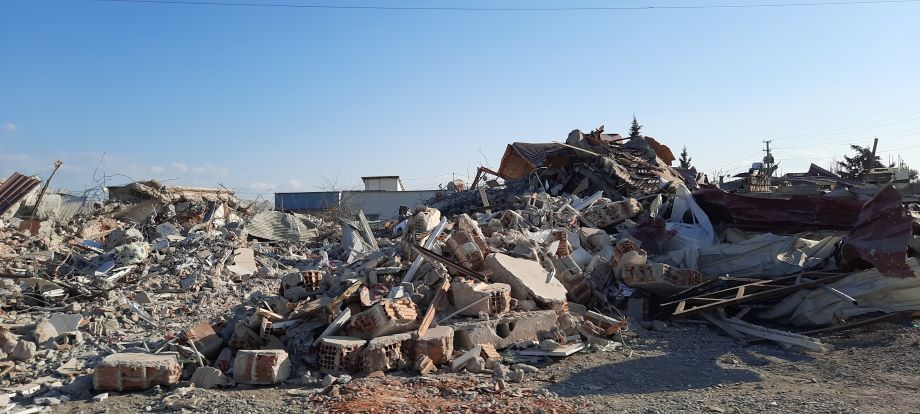Quakes hit in south-eastern Türkiye: Behind the scenes from Ankara
2023.08.23
-

- Tanaka Yuko Chief Representative JICA Türkiye Office
On the morning of 6th and 9th of August 1945, Hiroshima and Nagasaki were devastated by the atomic bomb, which ended the Second World War. Because of this, people in Japan think about peace especially on these days. Japan as a nation who has shown resilience by recovering from countless hardships such as the earthquakes and war, its experience can contribute to the world peace.
Half a year ago, February 6, 2023, magnitude 7.8 and 7.5 earthquakes struck south-eastern Türkiye followed by major aftershocks, resulting in the devastating damage killing more than 50,000 people. Japan immediately decided to dispatch search and rescue teams under Japan Disaster Relief operation, and JICA office in Ankara, where I am stationed as the Chief Representative, urgently prepared the necessary materials for rescue -- Turkish-Japanese interpreters, logistics information to get into the affected area -- and hurried to the airport to meet the rescue team.
We were assigned to operate in Kahramanmaraş, the epicenter of the quake. As we approach there, devastating sight shocked me. Both sides of the main road was completely down with collapsed buildings like pancakes with curtains and furniture used by the families until just a while ago now being exposed to the outside. “Mommy is under this building! Please rescue her," we were led to a building. I lost the words at the sight of people wrapped in blankets and anxiously praying for the safety of their families in freezing temperature.
The next site assigned to us was a community where non-Turkish language was spoken. South-eastern Türkiye, where the earthquake hit, is located on the border with Syria, accepting more than 3.7 million refugees since the Syrian crisis. Seeing the affected families evacuated made us realize, such a large number of these refugees had been crammed into a single building to live. The situation also surfaced the fact that there are the social integration issues we have to care during emergency relief efforts.
Rescue efforts continued for days and nights. One day, I met a man who was distributing hot çorbası (Turkish soup) in paper cups in a freezing dark night amid aftershocks. Having lost his family, the survivor still thanked us and said, "Thank you for coming all the way from Japan to help us. There is nothing more I can do for you, but here is a cup of soup" he humbly said handing me the soup. Our activities were supported by local people like him who, despite their grief on freezing nights, voluntarily did what they could to help. The encampment was set up by Iller Bank and the Kahramanmaraş Water and Sewerage Administration (KASKİ) we have closely worked for another water supply projects before the earthquake occurred. They were also the victims and survivors themselves, but busily provided basic water services to the citizens. At the same time, they gave us helping hands so we can set up the base of operations. The devastation has affected a vast area covering 11 prefectures in the south-east. I saw a man who was for a short time allowed to enter his apartment, which had been declared dangerous and off-limits. He was carrying out jars of pickles, a family delicacy. This brought back my memory when I was a student volunteer at the time of the Great Hanshin-Awaji Earthquake. Back then, a man asked me for warm food at a shelter, said, "Hey, you, I didn’t ask for this cold bread. Yeah, I know I have no choice but... " I felt the same survivor guilt and could not help crying. I exactly knew his emotions at that moment. In the aftermath of the Great Hanshin-Awaji Earthquake when I was volunteering, I had the same feeling. This episode always assures me that we have to be mindful of what the daily life means to each person, every time we address people, “I am praying for earlier restoration of your daily life."

Our relief operation started search and rescue in Kahramanmaras, followed by medical operations in Oguzeli in Gaziantep both for saving lives. Seamlessly, Japan dispatched a team of engineers to share knowledge of Japanese experience. Coincidentally, just one week before the earthquake occurred, Ankara-based Japanese Embassy and JICA had just had a talk with the Turkish government, who accepted the JDR team about Japanese experience on how to effectively enforce the building codes. The devastating sight made one of the engineers say “It is completely different from how I did the same exercise in Great East Japan Earthquake in 2011. … much worse than I imagined" This made me realize the pain of “sharing”. An Ex-Hyogo Prefecture official visited the disaster-stricken area and humbly shared his experience, stating, "I want to talk honestly about Japan's experience, because it is not all good things.” Japan and Türkiye are geographically far apart, but as earthquake-prone countries surrounded by several plates and active faults, we are comrades sharing the same fate. As disaster-prone countries, we can share our knowledge and experience to reduce risks even though we cannot reduce the disaster itself.
While conducting relief operations on the sites, JICA started to consult with the Turkish government and to lay the groundwork for technical cooperation and long-term financial cooperation to share Japan's knowledge and experience. Sharing the knowledge on seismic diagnosis of buildings, reconstruction planning, and disaster waste disposal, as part of existing technical assistance on disaster risk reduction were also seamlessly started just before the relief phase was about to finish and move on to the recovery phase.
The international community showed its solidarity to the Turkish people through various programs and projects. Turkish government and the international organizations conducted damage needs assessments, which was presented at the Donors’ Conference in Brussel in March. The donor community provided us with valuable insights on humanitarian point of view and donor coordination was very active to reduce the burden on the Turkish government. In May, when the state of emergency was lifted, governors and administrators from non-affected areas, who had been temporarily worked at the site to mutually support the administrative services of local governments in the affected areas, started to return to their hometowns. The presidential election was coming up soon. The real challenge for our counterparts in local administrative services in the affected areas was about to begin. It was clear that short-term support was helpful but not sustainable, and the phase was to plan for the longer-term recovery and reconstruction rooted in the local community, so JICA also was ready to support them in line with their challenges.
In Japan, psychosocial care and support for supporters are often necessary. Here, too, taking into consideration that the people on the government side have also been affected by the disaster: people we are working with in the recovery and reconstruction efforts are the survivors who have lost their family members. Some of them have been rescued out of the building where they had lost their loved ones. Even so, sometimes the governmental officials are being blamed by the local residents for their slow or inadequate services during the recovery process, which would lead to severe trauma in the long run. We would like to share the pain with them while respecting their own conditions and feelings.

On July 8, Japan’s Prime Minister Kishida Fumio held a telephone conversation with his Turkish counterpart, President Recep Tayyip Erdoğan, congratulating him on his reelection victory. Premier Kishida also promised the following: The grant aid provisions for debris removal, rehabilitation and reconstruction support of the affected areas; provisions of equipment and technical assistance that utilizes Japanese expertise in coordination with these activities. These assistance will be provided through JICA, in addition to the emergency assistance that has been provided so far. There are still enormous needs to be catered in the region, and daily life has not yet returned to normal. Needs will continue to increase and change, but my unwavering belief is to emphasizing with someone in need and thinking through the problem together is the best policy, which I learned as a young volunteer 28 years ago.
scroll